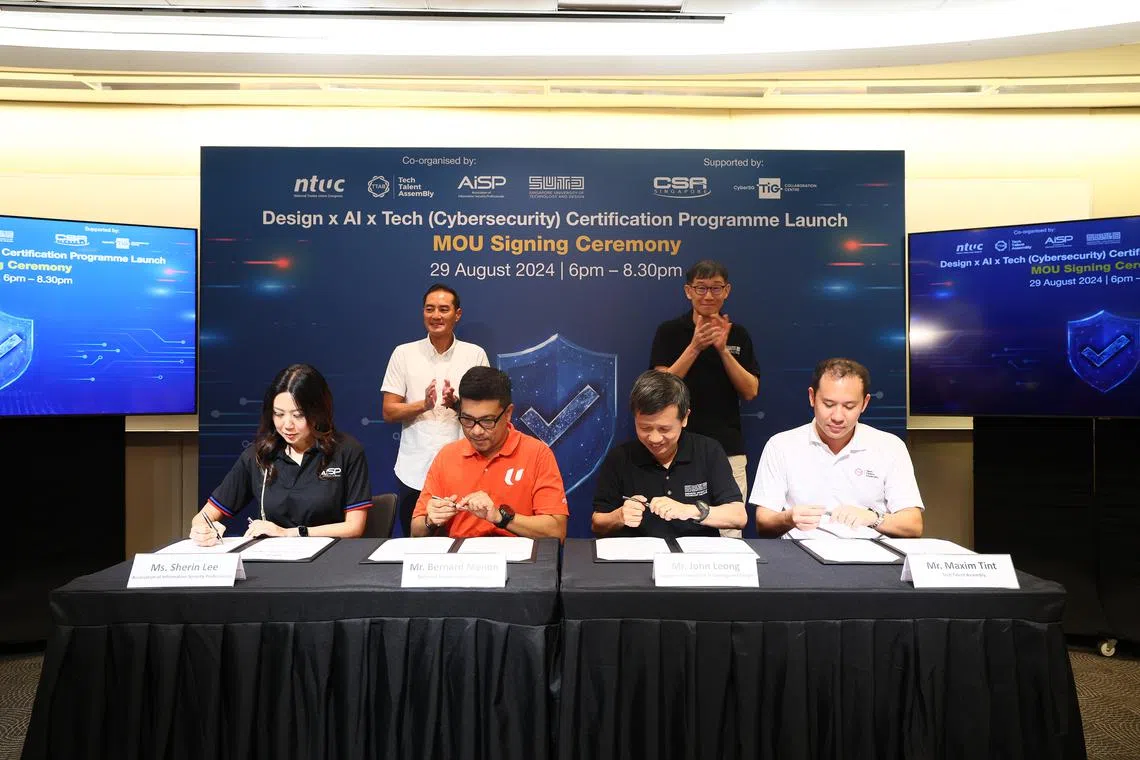New cyber-security programme will open doors for workers switching from non-tech jobs
Sign up now: Get ST's newsletters delivered to your inbox

Senior Minister of State for the Ministry of Digital Development and Information Tan Kiat How (standing, left) and SUTD President Phoon Kok Kwang witnessing the signing of an MOU for the new cyber-security programme.
PHOTO: ASSOCIATION OF INFORMATION SECURITY PROFESSIONALS
SINGAPORE – A new course starting from April 2025 aims to help workers with no technology background build new careers in cyber security.
The Design x AI x Tech (Cybersecurity) certification programme aims to train 200,000 professionals, managers, executives and technicians (PMETs).
Around 60 per cent of Singapore’s 2.4 million resident workers are PMETs.
Senior Minister of State for Digital Development and Information Tan Kiat How said demand for cyber-security professionals has been growing in recent years.
Full-time cyber-security professionals tripled from 4,000 in 2016 to about 12,000 in 2022, he said in his address to about 100 guests at the memorandum of understanding (MOU) signing to launch the programme at NTUC Centre on Aug 29.
“I’m confident the number is much higher. Our universities and polytechnics are collectively producing over 900 graduates with cyber-security specialisation each year.” But that is still not enough, he said.
“The Government and our training partners are also helping to fulfil the manpower demand by supporting career conversion programmes for non-cyber professionals to take on cyber-security roles.”
The cyber-security certification programme is being developed by the Singapore University of Technology and Design (SUTD), National Trades Union Congress (NTUC), Association of Information Security Professionals (AiSP) and Tech Talent Assembly.
Training will take six to 12 months to complete. The fees and the size of the first intake will be announced later, with registration expected to start in early 2025.
Students can use SkillsFuture credits to subsidise the fees, while NTUC members can apply for further subsidies under the Union Training Assistance Programme.
SUTD president Phoon Kok Kwang highlighted the unique cross-discipline design of the new certification programme, which will cover “everything from cyber-security AI (artificial intelligence) and tech, cyber-security operations to risk management”.
Students will be offered internships, as well as mentors from SUTD’s research centres or industry partners.
In 2020, the university conducted a separate year-long programme for more than 200 employees from the Cyber Security Agency of Singapore.
Its iTrust Research Lab, set up in 2012, is now recognised as a leader in cyber and cyber-physical security research, Professor Phoon added.
The new programme curriculum includes training on monitoring security threats, leading incident response efforts, maintaining systems and collaborating across teams to fortify security.
Participants will learn to design and manage security measures tailored for operational technology (OT) environments, ensuring that they comply with industry standards and regulatory requirements.
Students who complete the course can expect to find roles in security operation centres and OT systems.
The course also offers a chance to take the Qualified Information Security Professional certification programme offered by AiSP.
Mr Bernard Menon, director of UPME at NTUC, said the initiative not only offers non-tech workers the opportunity of a new career but also helps those already in the industry to sharpen their skills and do more for their organisations.
While AI is displacing some tech roles such as software developers and data analysts, it has raised the need for more cyber-security workers.
A new report from recruitment consultancy Hays pointed to an estimated 3.5 million cyber-security vacancies worldwide.
Faced with budget limits and high salaries for cyber-security talent, firms are settling for candidates without a tech background and retraining existing workers to fill gaps.
Only 28 per cent of security executives in Singapore rated their ability to attract these talents well, compared with 39 per cent worldwide, the Hays report noted.
Ms Sherin Y. Lee, an AiSP executive committee member, moved from a hospitality job to telecommunications in 2013 and joined cyber-security firm Ensign InfoSecurity in 2018, where she now heads its marketing efforts.
She recalled her initiation into the tech industry: “I struggled for close to a year before I even understood what I was selling. But I loved the challenge.”
She urges career switchers to keep learning and embrace ambiguity: “If you are going to survive in tech, the opportunities will always be in new start-ups that are building and figuring out their structures as they grow.
“Many cyber-security innovations and tech solutions are originating from Singapore. With this trend, it also means that if you work in a Singapore-headquartered cyber-security firm, you are likely to have to create your own content from scratch, rather than adapt from the technical content given by headquarters in the United States or United Kingdom.”



